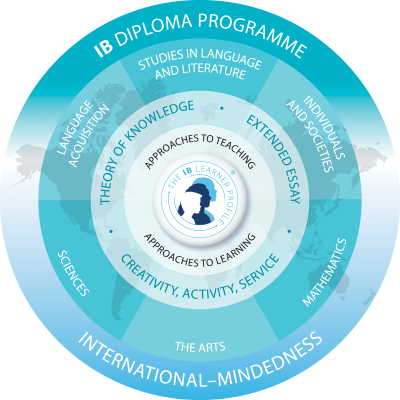Diploma Programme

At APIS, we are delighted to present the International Baccalaureate Diploma Programme – an exceptional academic experience that sets the stage for our students’ success, personal growth, and global engagement.
The International Baccalaureate Diploma Programme, often referred to as the IB DP, is a comprehensive two-year curriculum renowned worldwide for its rigorous and holistic approach to education. Designed for students aged 16 to 19, the programme provides a unique blend of academic challenge, critical thinking, and cultural awareness. It not only equips students with an exceptional breadth and depth of knowledge but also nurtures the development of essential skills, including research, communication, and self-management.
Structured around six subject groups, students engage with languages, humanities, sciences, mathematics, arts, and a foundational course called the Theory of Knowledge (TOK). This combination fosters interdisciplinary connections and encourages students to view their studies from multiple angles, creating a well-rounded perspective that is highly valuable in today’s interconnected world.
One of the most significant advantages of the IB DP is its emphasis on cultivating global citizens. Through the Creativity, Activity, Service (CAS) component, students actively participate in meaningful community projects, develop a sense of social responsibility, and gain invaluable life experiences beyond the classroom. Additionally, the Extended Essay challenges students to conduct in-depth research on a topic of personal interest, fostering independent inquiry and scholarly skills that are indispensable in higher education.
Universities around the globe recognize the merits of the IB DP and often offer advanced standing or credit for students who complete the programme. The skills honed throughout the IB journey – critical thinking, time management, cross-cultural understanding – not only prepare students for higher education but also set them on a trajectory for success in their chosen careers.
We invite you to explore our Grade 11-12 IB DP page further to learn about the enriching opportunities, dedicated faculty, and supportive community that make APIS a school for IB excellence. Join us as we embark on a path of intellectual curiosity, personal development, and global awareness through the International Baccalaureate Diploma Programme.
The IB Diploma Programme has proved to be a compelling pre-university course of study not only because it guarantees breadth of study, but it also provides opportunities for students to develop their independent research skills through an extended essay; to foster an understanding of the epistemological links across the different subject domains through its Theory of Knowledge course and to gain formal recognition of achievement in co-curricular activities through its Creativity, Activity, Service requirement.

Diploma students study six subjects from six subject groups, concurrently over two years, as well as the core elements of the programme (Theory of Knowledge, the extended essay and creativity, action, service). The six subject groups represent the major domains of learning across all subject disciplines of a curriculum.
At least three, and not more than four of the six subjects selected are taken at higher level (HL), 3 are then taken at standard level (SL). HL courses require 240 teaching hours, and require a greater depth of study across a broader range of content in the subject. SL courses require 150 hours and provide breadth of study across the whole Diploma Programme.
Flexibility in choosing higher-level courses allows the students to pursue areas of personal interest and to meet special requirements for university entrance within a balanced overall programme. The subjects are continually reviewed and revised to meet contemporary needs.
DP Subjects Offered at APIS:
Group 1: Language and Literature (details)
English Language & Literature – Standard Level and Higher Level
Chinese Language & Literature – Standard Level and Higher Level
Thai Language & Literature – Standard Level and Higher Level
Group 2: Language Acquisition
Language Ab Initio SL (details)
Japanese
Spanish
Language B – Standard Level and Higher Level (details)
Group 3: Individuals & Societies
Business Management – Standard Level (details) and Higher Level (details)
Group 4: Experimental Sciences
Group 5: Mathematics
Group 6: The Arts
Visual Arts – Standard Level (details) and Higher Level (details)
Interdisciplinary Studies
Environmental Systems & Societies – Standard Level and Higher Level (details)
Diploma students study six subjects from six subject groups, concurrently over two years, as well as the core elements of the programme (Theory of Knowledge, the Extended Essay and Creativity, Action, & Service).
Three subjects selected are taken at a higher level (HL), and 3 are then taken at a standard level (SL). HL courses require 240 teaching hours and require a greater depth of study across a broader range of content in the subject. SL courses require 150 hours and provide a breadth of study across the whole Diploma Programme.
Flexibility in choosing higher-level courses allows the students to pursue areas of personal interest and to meet special requirements for university entrance within a balanced overall programme. The subjects are continually reviewed and revised to meet contemporary needs.















